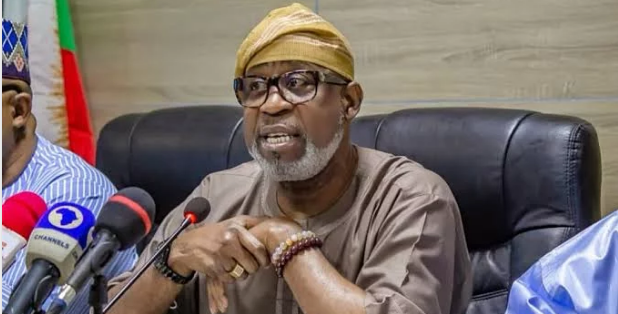Minister of Solid Minerals Development, Dr Dele Alake, has expressed concern over Nigeria’s longstanding underperformance in the mining sector. Despite Nigeria’s vast mineral wealth, the sector has contributed less than one per cent to the country’s Gross Domestic Product (GDP) for decades.
Speaking yesterday in Abuja during his keynote address at the Africa Commodities Conference and Exhibition (ACCE), the minister, represented by Olajide Olusola, emphasised the urgent need for reforms and strategic investments to reposition the sector.
“Nigeria is blessed with over 44 commercially viable solid minerals spread across more than 500 locations,” Alake said. “From gold in Zamfara and Kebbi, to lithium in Nasarawa and Kogi, to barite in Cross River, and tantalite in Osun—our nation is richly endowed. Yet for decades, the sector has remained dormant, contributing less than 1% to GDP.”
The conference “Building Generational Wealth: Leveraging Mineral Resources for All Nigerians” seeks to drive sustainable and inclusive economic growth through the solid minerals value chain.
Alake noted that the conference’s theme aligns closely with President Bola Ahmed Tinubu’s Renewed Hope Agenda, under which the ministry implements targeted reforms. These include attracting investments, formalising artisanal mining, improving geological data availability, ensuring environmental sustainability, and enhancing local value addition.
“The time to act is now,” Alake declared. “The solid minerals sector is no longer a footnote in Nigeria’s economic story. It is the next frontier, and the vehicle through which we can build inclusive, intergenerational wealth.”
He called for a coalition of stakeholders, including government, private sector, civil society, academia, and host communities, to promote long-term value creation rather than short-term exploitation.
For his part, the national president of the Miners Association of Nigeria (MAN), Dele Ayankele, represented by Adogba Ogar, highlighted the challenges faced by indigenous operators, especially the lack of access to finance, which he described as the foremost obstacle.
“Access to finance remains the number one challenge facing artisanal and small-scale miners (ASM),” Ogar said. “Mining is a capital-intensive and high-risk sector, and without targeted funding, our local operators cannot survive, let alone thrive.”
He cited other persistent issues such as outdated technology, poor infrastructure, policy inconsistencies, environmental degradation, insecurity, inadequate training, and competition from better-funded foreign firms.
“Most indigenous miners still rely on archaic techniques and lack access to modern equipment, which reduces productivity and increases operational costs,” he added. “Combined with poor road networks, erratic electricity, and limited water access, operations costs become unsustainable.”
Also speaking at the event, the chief executive officer of Mica Equity Allocation Ltd., Mr Michael Akueche, commended the ministry’s and stakeholders’ collaboration in convening the conference. He described the event as a timely step towards unlocking the full potential of Nigeria’s solid minerals sector.
The Africa Commodities Conference and Exhibition brought together investors, miners, regulators, and trade experts to explore strategies for advancing marketing, financing, and policy development across Africa’s mineral commodities ecosystem.



